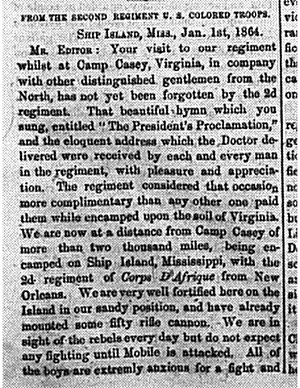James T. S. Taylor Reports the Civil War (Part 1): Voyage to the Gulf Coast
by William B. Kurtz | | Thursday, March 4, 2021 - 12:12

Sometime in 1862, a free Black man named James T. S. Taylor (1840-1918) ran away from Charlottesville, Virginia, to freedom in Washington, D.C. Describing his harrowing journey two years later in a letter to Abraham Lincoln, Taylor went on to serve as the commissary sergeant of the 2nd USCT regiment. Posted to Florida throughout the war after a brief stop in the Department of the Gulf, Taylor wrote a series of five letters describing his regiment’s experiences to The Anglo-African, a leading Black newspaper published in New York City. As we prepare to launch our Black Virginians in Blue digital project on April 13, the Nau Center will publish one of these letters every week as a preview of the primary sources that have been collected and transcribed on our project’s website. Here is the first letter Taylor wrote for the paper, describing the regiment’s journey from its training grounds at Camp Casey, Virginia, the reception it received while marching through Philadelphia and New York, and finally its voyage by sea to New Orleans and then Ship Island, Mississippi.
FROM THE SECOND REGIMENT U. S. TROOPS.
SHIP ISLAND, MISS., Jan. 1st, 1864.
MR. EDITOR: Your visit to our regiment whilst at Camp Casey, Virginia, in company with other distinguished gentlemen from the North, has not yet been forgotten by the 2d regiment. That beautiful hymn which you sung, entitled “The President’s Proclamation,” and the eloquent address which the Doctor delivered were received by each and every man in the regiment, with pleasure and appreciation. The regiment considered that occasion more complimentary than any other one paid them while encamped upon the soil of Virginia. We are now at a distance from Camp Casey of more than two thousand miles, being encamped on Ship Island, Mississippi, with the 2d. regiment of Corps D’Afrique from New Orleans. We are very well fortified here on the Island in our sandy position, and have already mounted some fifty rifle cannon. We are in sight of the rebels every day but do not expect any fighting until Mobile is attacked. All of the boys are extremly anxious for a fight and have made desperate calculations for the rebels.
When our regiments were passing through the cities of Philadelphia and New York we received a most favorable and kind reception from the citizens, both white and colored, and that hospitable breakfast which we partook of in Philadelphia, can never be forgotten by us.
We were on the ocean seven days, and on the 8th we arrived at New Orleans safe, with the exception of two men who died in Company B, from the effects of the sea. They were both residents of Norfolk, Virginia. The health of the regiment at present is very good. It was quite cheering when we reached the Mississippi river with rebeldom on both sides, seeing thousands who have been made free by the President’s Proclamation coming from all parts of the cotton and sugar fields to the river banks with hats and handfuls of oranges for us and cheering us loudly, making us welcome to their warm and sunny homes. The gallant 2d could be heard giving them compliments of cheers with freedom and liberty to them for ever.
When the regiment moves or gets into a battle I shall give you the particulars. Nothing more, but hoping you will give us all the news in the rear, whilst we keep you posted in news from the front.
JAMES T. S. TAYLOR, Comp. Sergeant
SOURCE: Printed in The Anglo-African, January 30, 1864.
